-
Common Sense Electrical Advice
Your tripping breaker.
A breaker that trips immediately after its reset is telling you that there’s an electrical problem. Sure, sometimes the breaker itself is to blame, and in some cases there may just be too large an electrical load operating on that circuit. A circuit breaker has an amp maximum, you can usually see the number of amps on the breaker, 15, 20, 30 and so on. If you put more demand on it than the circuit breaker is rated, it will do what it is designed to do, trip the circuit and shut it down. But sometimes the breaker is tripping because there’s a severe electrical problem, something is not right in the electrical system. Keep pressing or resetting that breaker, and you’re likely to cause a fire.
Know when to fight and when to flee, or better safe than sorry.
Firefighters recommend that if you have any doubt about fighting a fire, you’re best bet is to get out of the house as quickly as possible. Once you’re safely outside, and then call 911. Never put yourself between a fire and your exit out of the house to try and fight the fire.
Never throw water on an electrical fire.
This is just common sense, electricity and water don’t get along well, but in the heat (ahem) of the moment, throwing water can seem tempting, Water conducts electricity (this is why you don’t want to be in water during a lightning storm), so spraying water on the fire could cause it to get larger. Instead, use your chemical fire extinguisher and remember first the advice above about better safe than sorry, know when to flee.
Lights that flicker or trip the circuit breaker
Possible Cause: Loose wiring splice, or a light fixture that’s worn out and needs to be replaced.
Solution: Call a qualified licensed electrician who can check if the cause is loose wiring or something else.
Outlets with a faceplate that’s warm to the touch or a burning smell.
Cause: An overly large electrical load operating on that outlet, undersized wiring or a loose electrical splice. (Note: it’s not unusual for dimmer switches, especially large ones, to be warm. Unless the switch face is actually too hot to touch, a warm dimmer is not a hazard in most cases)
Solution: Best to shut off the power to that circuit until you can have a qualified licensed electrician evaluate what is causing the problem.
Extension cord use is not the best solution to not enough outlets for your stuff.
Sure, extension cords serve a useful function when you need to get power where there is no plug. But using an extension cord as a permanent solution in places where you frequently find you need power can be dangerous. Especially when you find yourself putting things over the extension cords because they can be unsightly. Never ever place a rug over an extension cord, this is a fire hazard. Best solution is to have an electrician install an outlet in that place you seem to be always using an extension cord, it’s a much safer solution to this problem.
Loose switches or outlet receptacles and plugs
Hey, they still work so why get them fixed, why not wait until they don’t work anymore and then I’ll have them repaired? Loose switches and plugs can cause a lot of problems and are a safety issue. The plug and the switch should be secure, they are electrical devices designed for use and not surprises in the form of shocking you, tripping your breaker or causing a fire when the wires inside start touching.
Ceiling fans that slowly wobble
Likely cause could be whoever installed the fan did not use a fan rated box to secure the ceiling fan to the ceiling. While this may work for a while, over time there is a danger the ceiling fan could suddenly drop down from the ceiling and be hanging by the wire providing power. No one wants that to happen over their head!
-
Safety In The Home
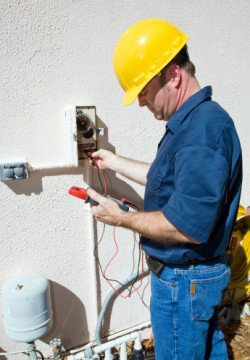 Electrical safety at home should be one of the highest priorities for you and your family. Most of us know to be careful when using candles, but what about portable heaters, gas appliances, and gasoline- or diesel-powered generators to light or heat our home? These items might be dangerous and require extra safety measures.
Electrical safety at home should be one of the highest priorities for you and your family. Most of us know to be careful when using candles, but what about portable heaters, gas appliances, and gasoline- or diesel-powered generators to light or heat our home? These items might be dangerous and require extra safety measures.Accidents can happen to anyone. However, if we know how they are most likely to occur, we can prevent electrical accidents in and around the home. Here are a few tips you can follow to help you avoid common electrical problems – and ensure the safety of you and your family.
- Circuit breakers/fuses are safety devices and cut off power to an electrical circuit if it becomes dangerously overloaded or if a short circuit occurs.
- If you lose power to one of your house circuits, check the equipment on the circuit to determine what caused the outage.
- Make sure your hands, and the floor you are standing on, are dry.
- Push the breaker switch to the full OFF position, then back to ON. Or carefully replace the fuse.
- If you cannot find the problem and the breaker or fuse keeps shutting off power, call Delta Electric as it may be that your home’s electrical system may need to be upgraded.
- Treat electric lamp or appliance cords and extension cords with the same respect as house wiring and protect cords from damage.
- Do not place a cord where it’s likely to be walked on. Avoid twisting, kinking, or crushing the cord and keep cords away from heat or water.
One more home item people overlook are their trees in the yard. If you want to plant trees that will grow to more than 30 feet tall, make sure they are well away from power lines.
Remember, Delta Electric offers prompt professional service on any commercial, residential, or mobile-home electrical work you need and service the South Bay area. Don’t forget to bookmark our site so you’ll have our contact information handy when you need us. And for all your electrical installation, maintenance and repair needs, call or email Delta Electric today!
-
When The Lines Go Down
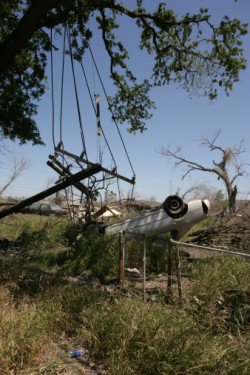 No matter where you live and no matter what the season, there may be a time when you come across a downed power line. Most people know that touching a live power line can cause serious injury or death. However, many times you can’t tell by looking whether a line is “hot” or not. Even if a downed line isn’t actively sparking, you must always assume it is carrying electricity.
No matter where you live and no matter what the season, there may be a time when you come across a downed power line. Most people know that touching a live power line can cause serious injury or death. However, many times you can’t tell by looking whether a line is “hot” or not. Even if a downed line isn’t actively sparking, you must always assume it is carrying electricity.So, what should you do when you come across a downed power line? Follow these important tips:
- Don’t go near the wire, or anything it is touching.
- Warn others to stay away.
- Call your local police or fire department.
It’s important to provide the exact location when reporting an electric emergency, so to ensure proper aide, provide some of the following information:
- The nature of the emergency and whether personal injury or danger is involved
- The village or community in which the line is down, along with the house number, street name, and nearest cross street and direction (north, east, south, or west) from the location.
- If you can, locate the pole number or the nearest phone number at the location if available.
Always remember to keep your distance from the line also and ensure that others do not go near it till help arrives. You can also call Delta Electric for assistance!
We offer prompt professional service on any commercial, residential, or mobile-home electrical work you need and service the South Bay area. Don’t forget to bookmark our site so you’ll have our contact information handy when you need us. And for all your electrical installation, maintenance, and repair needs, call or email Delta Electric today!
-
Deck The Halls Safely
Its part of the holiday season that, to some, is the best part of the season. Bright lights, festive decorations all displayed for family and friends to enjoy and aide in creating the spirit of the holidays. But, if you’re planning to deck your halls this year chances are, you’ll end up using an extension cord to help you. While they are a convenient way to supply power right where you need it, they can also create hazards if not used safely.
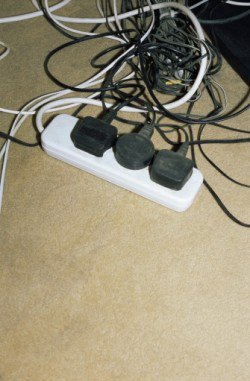
Here are a few simple tips to help avoid a disaster this holiday season:
- Extension cords should only be used on a temporary basis.
- Make sure extension cords are properly rated for their intended use, indoor or outdoor, and meet or exceed the power needs of the appliance or device being used.
- Inspect cords for damage before use. Check for cracked or frayed sockets, loose or bare wires, and loose connections.
- Never use a cord that feels hot or is damaged in any way.
- Do not run extension cords through walls or ceilings. This may cause the cord to overheat, creating a serious fire hazard.
- Do not nail or staple electrical cords to walls or baseboards.
- Make sure that cords are not pinched in doors, windows, or under heavy furniture, which could damage the cord’s insulation.
- Keep extension cords out of high-traffic areas like doorways or walkways where they pose a tripping hazard.
- Insert plugs fully so that no part of the prongs is exposed when the extension cord is in use.
For more information on electrical safety, call Delta Electric at the location nearest you – or call 1-800-321-2752.
-
Electric Heater Safety Tips
When the cooler weather moves in, many people op for a space or compact heater to warm their
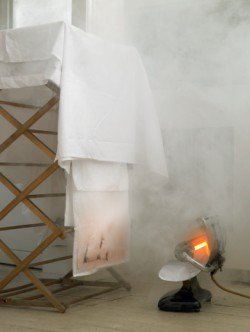 spaces. Either at home or at the office, a compact electric heater is convenient and cost-effective, because it directs heat to a specific location. But it is also potentially hazardous if not used correctly.
spaces. Either at home or at the office, a compact electric heater is convenient and cost-effective, because it directs heat to a specific location. But it is also potentially hazardous if not used correctly.In fact, between 1999 and 2002, electric heaters were responsible for an average 9,900 residential fires and 190 fatalities per year, according to the U.S. Consumer Product Safety Commission (CPSC). However, there are a few things you can do to keep you and your family safe;
• Be sure to place the heater on a level, hard and nonflammable surface (such as ceramic tile floor).
• Keep the electric heater at least three feet from bedding, drapes, furniture, and other flammable materials, and keeping children and pets away from space heaters.
• Be sure to turn off the heater when going to sleep or leaving the area or space you’re heating.
• Use a space heater that has been tested to the latest safety standards and certified by a nationally-recognized testing laboratory.
• Be sure to have a smoke alarm with fresh batteries on each level of the house, inside every bedroom, and outside the bedrooms in each sleeping area. In addition, have a carbon monoxide alarm outside the bedrooms in each separate sleeping area.
For more information on electrical safety, call Delta Electric at the location nearest you – or call 1-800-321-2752.
-
Top 10 Reasons to Choose Delta Electric in San Jose
Serving the South Bay area for 30 years, Delta Electric has the experience necessary to provide the highest quality service to customers. Below are the top 10 reasons to choose Delta Electric.
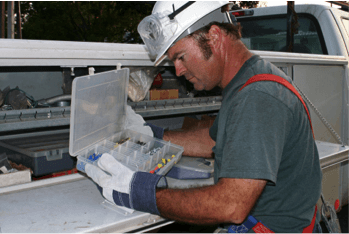
- We guarantee all of our work for 10 years.
- No job is too large or small for us.
- We employ only the most highly trained professionals.
- We provide 24-hour emergency services.
- We ensure that work is done right the first time.
- We offer customers with reasonable rates and no hidden charges whatsoever.
- We offer free estimates on installations.
- We strive to provide service that exceeds customer expectations.
- We come licensed and bonded.
- We offer money-saving coupons.
To learn more about how Delta Electric can help with your next residential, commercial, industrial or mobile-home electric work, call 408-224-0176 today!
-
Is Your Home At Risk?
According to a recent investigation done by the NBC Bay Area Investigative Unit, if your home was built before 1990, it may have a faulty Federal Pacific circuit breaker and could be a fire risk. It’s a fact that been known for years, but there has never been a recall.
The “Stab-Lok” circuit breaker and panel produced by Federal Pacific Electric (FPE) installed in hundreds of thousands of homes in the Bay Area may cause house fires, according decades of documentation and electrical experts interviewed by the NBC Bay Area Investigative Unit. Stab-Lok circuit breakers are most commonly found in houses built before 1990.
RECENT POSTS
categories
- Uncategorized
- Delta Electric
- Commercial Electrical
- Residential Electrical
- Electric Circuits
- Dedicated Circuits
- Circuit Breakers
- Electrical Panels
- Electrical Wiring
- Safety Inspections
- copper wires
- Electrician San Jose
- Trained Electricians
- Electrical Services San Jose
- Malfunctioning Electrical Outlets
- Circuit Breaker
- Grounding
- safety
- Flickering Lights
- Arc Fault Breakers
- electrical system
- Aluminum Wiring
- Circuit Interrupters
- House Surge Protection
- Zinsco Panel Warnings
- Wiring Conversion
- GFCI outlet
- professional electrician
- Knob-and-Tube Wiring
- modern home electrical system
- Fuses
- Electric Car Charger
- Electrical Repair
Archives
2025
2024
2023
2018
2017
- December (4)
- November (4)
- October (5)
- September (4)
- August (4)
- July (4)
- June (4)
- May (4)
- April (4)
- March (3)
- February (4)
- January (3)
2016
- December (3)
- November (4)
- October (4)
- September (4)
- August (4)
- July (4)
- June (4)
- May (4)
- April (4)
- March (4)
- February (4)
- January (4)
2015
- December (4)
- November (4)
- October (4)
- September (4)
- August (3)
- July (4)
- June (4)
- May (3)
- April (4)
- March (4)
- February (2)
2014
- December (3)
- November (4)
- October (4)
- September (6)
- August (2)
- July (3)
- May (2)
- April (1)
- March (2)
- February (1)
- January (1)

